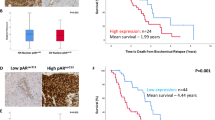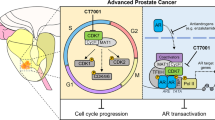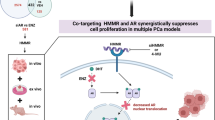Abstract
Androgen receptor (AR)-mediated gene expression continues to have a critical role in promoting castration-resistant prostate cancer (CRPC) survival and growth even after androgen deprivation therapy. AR cistrome analyses in CRPC cells have identified a large number of AR target genes involved in proliferative and cell cycle-related functions, and hold promise for development of novel therapeutic approaches for CRPC. However, there is little understanding of how these genes function in vivo and what the clinical implications are. We previously reported that secretory leukocyte peptidase inhibitor (SLPI) is regulated by the AR in a ligand-independent manner in CRPC cells and required for CRPC cell proliferation under androgen-deprived conditions. SLPI is a secreted serine protease inhibitor, which is overexpressed in a number of cancers, including lung, breast and ovarian cancer, and involved in tumor progression. However, the oncogenic potential of SLPI in prostate cancer remains unknown. Here we provide the first evidence that SLPI is upregulated in a subset of CRPC cell lines and CRPC patient tumors. In addition, serum SLPI levels are significantly elevated in metastatic CRPC patients compared with hormone naive patients, raising the possibility that this could serve as a biomarker. We demonstrated that SLPI expression has functional significance, as it promotes CRPC cell survival and growth after androgen withdrawal in vivo and in vitro. Last, we demonstrated that the oncogenic effect of SLPI may be due to protection of growth factor progranulin from enzymatic cleavage or suppression of CRPC cell apoptosis independent of anti-protease activity of SLPI. These findings implicate SLPI as a potential biomarker of resistance to AR inhibition and therapeutic target for CRPC treatment.
This is a preview of subscription content, access via your institution
Access options
Subscribe to this journal
Receive 50 print issues and online access
$259.00 per year
only $5.18 per issue
Buy this article
- Purchase on Springer Link
- Instant access to full article PDF
Prices may be subject to local taxes which are calculated during checkout







Similar content being viewed by others
References
American Cancer Society Cancer Facts & Figures 2015. American Cancer Society: Atlanta, GA, USA, 2015.
Bernard B, Sweeney CJ . Management of metastatic hormone-sensitive prostate cancer. Curr Urol Rep 2015; 16: 14.
Shen MM, Abate-Shen C . Molecular genetics of prostate cancer: new prospects for old challenges. Genes Dev 2010; 24: 1967–2000.
Karantanos T, Corn PG, Thompson TC . Prostate cancer progression after androgen deprivation therapy: mechanisms of castrate resistance and novel therapeutic approaches. Oncogene 2013; 32: 5501–5511.
de Bono JS, Logothetis CJ, Molina A, Fizazi K, North S, Chu L et al. Abiraterone and increased survival in metastatic prostate cancer. N Engl J Med 2011; 364: 1995–2005.
Scher HI, Fizazi K, Saad F, Taplin ME, Sternberg CN, Miller K et al. Increased survival with enzalutamide in prostate cancer after chemotherapy. N Engl J Med 2012; 367: 1187–1197.
Ryan CJ, Smith MR, de Bono JS, Molina A, Logothetis CJ, de Souza P et al. Abiraterone in metastatic prostate cancer without previous chemotherapy. N Engl J Med 2013; 368: 138–148.
Decker KF, Zheng D, He Y, Bowman T, Edwards JR, Jia L . Persistent androgen receptor-mediated transcription in castration-resistant prostate cancer under androgen-deprived conditions. Nucleic Acids Res 2012; 40: 10765–10779.
Bouchard D, Morisset D, Bourbonnais Y, Tremblay GM . Proteins with whey-acidic-protein motifs and cancer. Lancet Oncol 2006; 7: 167–174.
Tanner MM, Grenman S, Koul A, Johannsson O, Meltzer P, Pejovic T et al. Frequent amplification of chromosomal region 20q12-q13 in ovarian cancer. Clin Cancer Res 2000; 6: 1833–1839.
Nukiwa T, Suzuki T, Fukuhara T, Kikuchi T . Secretory leukocyte peptidase inhibitor and lung cancer. Cancer Sci 2008; 99: 849–855.
Cheng WL, Wang CS, Huang YH, Liang Y, Lin PY, Hsueh C et al. Overexpression of a secretory leukocyte protease inhibitor in human gastric cancer. Int J Cancer 2008; 123: 1787–1796.
Hoskins E, Rodriguez-Canales J, Hewitt SM, Elmasri W, Han J, Han S et al. Paracrine SLPI secretion upregulates MMP-9 transcription and secretion in ovarian cancer cells. Gynecol Oncol 2011; 122: 656–662.
Kluger HM, Chelouche Lev D, Kluger Y, McCarthy MM, Kiriakova G, Camp RL et al. Using a xenograft model of human breast cancer metastasis to find genes associated with clinically aggressive disease. Cancer Res 2005; 65: 5578–5587.
Lowe AW, Olsen M, Hao Y, Lee SP, Taek Lee K, Chen X et al. Gene expression patterns in pancreatic tumors, cells and tissues. PLoS ONE 2007; 2: e323.
Devoogdt N, Rasool N, Hoskins E, Simpkins F, Tchabo N, Kohn EC . Overexpression of protease inhibitor-dead secretory leukocyte protease inhibitor causes more aggressive ovarian cancer in vitro and in vivo. Cancer Sci 2009; 100: 434–440.
Devoogdt N, Hassanzadeh Ghassabeh G, Zhang J, Brys L, De Baetselier P, Revets H . Secretory leukocyte protease inhibitor promotes the tumorigenic and metastatic potential of cancer cells. Proc Natl Acad Sci USA 2003; 100: 5778–5782.
Kluger HM, Kluger Y, Gilmore-Hebert M, DiVito K, Chang JT, Rodov S et al. cDNA microarray analysis of invasive and tumorigenic phenotypes in a breast cancer model. Lab Invest 2004; 84: 320–331.
McElvaney NG, Nakamura H, Birrer P, Hebert CA, Wong WL, Alphonso M et al. Modulation of airway inflammation in cystic fibrosis. In vivo suppression of interleukin-8 levels on the respiratory epithelial surface by aerosolization of recombinant secretory leukoprotease inhibitor. J Clin Invest 1992; 90: 1296–1301.
Song X, Zeng L, Jin W, Thompson J, Mizel DE, Lei K et al. Secretory leukocyte protease inhibitor suppresses the inflammation and joint damage of bacterial cell wall-induced arthritis. J Exp Med 1999; 190: 535–542.
Lentsch AB, Yoshidome H, Warner RL, Ward PA, Edwards MJ . Secretory leukocyte protease inhibitor in mice regulates local and remote organ inflammatory injury induced by hepatic ischemia/reperfusion. Gastroenterology 1999; 117: 953–961.
Gipson TS, Bless NM, Shanley TP, Crouch LD, Bleavins MR, Younkin EM et al. Regulatory effects of endogenous protease inhibitors in acute lung inflammatory injury. J Immunol 1999; 162: 3653–3662.
Simpkins FA, Devoogdt NM, Rasool N, Tchabo NE, Alejandro EU, Kamrava MM et al. The alarm anti-protease, secretory leukocyte protease inhibitor, is a proliferation and survival factor for ovarian cancer cells. Carcinogenesis 2008; 29: 466–472.
Rasool N, LaRochelle W, Zhong H, Ara G, Cohen J, Kohn EC . Secretory leukocyte protease inhibitor antagonizes paclitaxel in ovarian cancer cells. Clin Cancer Res 2010; 16: 600–609.
Thompson M, Lapointe J, Choi YL, Ong DE, Higgins JP, Brooks JD et al. Identification of candidate prostate cancer genes through comparative expression-profiling of seminal vesicle. Prostate 2008; 68: 1248–1256.
Thalmann GN, Anezinis PE, Chang SM, Zhau HE, Kim EE, Hopwood VL et al. Androgen-independent cancer progression and bone metastasis in the LNCaP model of human prostate cancer. Cancer Res 1994; 54: 2577–2581.
Varambally S, Yu J, Laxman B, Rhodes DR, Mehra R, Tomlins SA et al. Integrative genomic and proteomic analysis of prostate cancer reveals signatures of metastatic progression. Cancer Cell 2005; 8: 393–406.
Chandran UR, Ma C, Dhir R, Bisceglia M, Lyons-Weiler M, Liang W et al. Gene expression profiles of prostate cancer reveal involvement of multiple molecular pathways in the metastatic process. BMC Cancer 2007; 7: 64.
Zhu J, Nathan C, Jin W, Sim D, Ashcroft GS, Wahl SM et al. Conversion of proepithelin to epithelins: roles of SLPI and elastase in host defense and wound repair. Cell 2002; 111: 867–878.
Huang, da W, Sherman BT, Lempicki RA . Systematic and integrative analysis of large gene lists using DAVID bioinformatics resources. Nat Protoc 2009; 4: 44–57.
Lee EC, Zhan P, Schallhom R, Packman K, Tenniswood M . Antiandrogen-induced cell death in LNCaP human prostate cancer cells. Cell Death Differ 2003; 10: 761–771.
Chopra DP, Menard RE, Januszewski J, Mattingly RR . TNF-alpha-mediated apoptosis in normal human prostate epithelial cells and tumor cell lines. Cancer Lett 2004; 203: 145–154.
Wang D, Montgomery RB, Schmidt LJ, Mostaghel EA, Huang H, Nelson PS et al. Reduced tumor necrosis factor receptor-associated death domain expression is associated with prostate cancer progression. Cancer Res 2009; 69: 9448–9456.
Davis JS, Nastiuk KL, Krolewski JJ . TNF is necessary for castration-induced prostate regression, whereas TRAIL and FasL are dispensable. Mol Endocrinol 2011; 25: 611–620.
Ameshima S, Ishizaki T, Demura Y, Imamura Y, Miyamori I, Mitsuhashi H . Increased secretory leukoprotease inhibitor in patients with nonsmall cell lung carcinoma. Cancer 2000; 89: 1448–1456.
Tsukishiro S, Suzumori N, Nishikawa H, Arakawa A, Suzumori K . Use of serum secretory leukocyte protease inhibitor levels in patients to improve specificity of ovarian cancer diagnosis. Gynecol Oncol 2005; 96: 516–519.
Johnsen M, Lund LR, Romer J, Almholt K, Dano K . Cancer invasion and tissue remodeling: common themes in proteolytic matrix degradation. Curr Opin Cell Biol 1998; 10: 667–671.
Liotta LA, Kohn EC . The microenvironment of the tumour-host interface. Nature 2001; 411: 375–379.
Higashiyama M, Doi O, Yokouchi H, Kodama K, Nakamori S, Tateishi R . Alpha-1-antichymotrypsin expression in lung adenocarcinoma and its possible association with tumor progression. Cancer 1995; 76: 1368–1376.
Grondahl-Hansen J, Christensen IJ, Rosenquist C, Brunner N, Mouridsen HT, Dano K et al. High levels of urokinase-type plasminogen activator and its inhibitor PAI-1 in cytosolic extracts of breast carcinomas are associated with poor prognosis. Cancer Res 1993; 53: 2513–2521.
Hough CD, Sherman-Baust CA, Pizer ES, Montz FJ, Im DD, Rosenshein NB et al. Large-scale serial analysis of gene expression reveals genes differentially expressed in ovarian cancer. Cancer Res 2000; 60: 6281–6287.
Zelvyte I, Wallmark A, Piitulainen E, Westin U, Janciauskiene S . Increased plasma levels of serine proteinase inhibitors in lung cancer patients. Anticancer Res 2004; 24: 241–247.
Kataoka H, Itoh H, Koono M . Emerging multifunctional aspects of cellular serine proteinase inhibitors in tumor progression and tissue regeneration. Pathol Int 2002; 52: 89–102.
Tomlins SA, Rhodes DR, Yu J, Varambally S, Mehra R, Perner S et al. The role of SPINK1 in ETS rearrangement-negative prostate cancers. Cancer Cell 2008; 13: 519–528.
Flavin R, Pettersson A, Hendrickson WK, Fiorentino M, Finn S, Kunz L et al. SPINK1 protein expression and prostate cancer progression. Clin Cancer Res 2014; 20: 4904–4911.
Wagenblast E, Soto M, Gutierrez-Angel S, Hartl CA, Gable AL, Maceli AR et al. A model of breast cancer heterogeneity reveals vascular mimicry as a driver of metastasis. Nature 2015; 520: 358–362.
He Z, Ong CH, Halper J, Bateman A . Progranulin is a mediator of the wound response. Nat Med 2003; 9: 225–229.
He Z, Bateman A . Progranulin (granulin-epithelin precursor, PC-cell-derived growth factor, acrogranin) mediates tissue repair and tumorigenesis. J Mol Med (Berl) 2003; 81: 600–612.
Monami G, Emiliozzi V, Bitto A, Lovat F, Xu SQ, Goldoni S et al. Proepithelin regulates prostate cancer cell biology by promoting cell growth, migration, and anchorage-independent growth. Am J Pathol 2009; 174: 1037–1047.
Pan CX, Kinch MS, Kiener PA, Langermann S, Serrero G, Sun L et al. PC cell-derived growth factor expression in prostatic intraepithelial neoplasia and prostatic adenocarcinoma. Clin Cancer Res 2004; 10: 1333–1337.
Tangkeangsirisin W, Hayashi J, Serrero G . PC cell-derived growth factor mediates tamoxifen resistance and promotes tumor growth of human breast cancer cells. Cancer Res 2004; 64: 1737–1743.
Lovat F, Bitto A, Xu SQ, Fassan M, Goldoni S, Metalli D et al. Proepithelin is an autocrine growth factor for bladder cancer. Carcinogenesis 2009; 30: 861–868.
Ho JC, Ip YC, Cheung ST, Lee YT, Chan KF, Wong SY et al. Granulin-epithelin precursor as a therapeutic target for hepatocellular carcinoma. Hepatology 2008; 47: 1524–1532.
Taggart CC, Cryan SA, Weldon S, Gibbons A, Greene CM, Kelly E et al. Secretory leucoprotease inhibitor binds to NF-kappaB binding sites in monocytes and inhibits p65 binding. J Exp Med 2005; 202: 1659–1668.
Jan Treda C, Fukuhara T, Suzuki T, Nakamura A, Zaini J, Kikuchi T et al. Secretory leukocyte protease inhibitor modulates urethane-induced lung carcinogenesis. Carcinogenesis 2014; 35: 896–904.
Jia L, Shen HC, Wantroba M, Khalid O, Liang G, Wang Q et al. Locus-wide chromatin remodeling and enhanced androgen receptor-mediated transcription in recurrent prostate tumor cells. Mol Cell Biol 2006; 26: 7331–7341.
Zheng D, Decker KF, Zhou T, Chen J, Qi Z, Jacobs K et al. Role of WNT7B-induced noncanonical pathway in advanced prostate cancer. Mol Cancer Res 2013; 11: 482–493.
Hu F, Padukkavidana T, Vaegter CB, Brady OA, Zheng Y, Mackenzie IR et al. Sortilin-mediated endocytosis determines levels of the frontotemporal dementia protein, progranulin. Neuron 2010; 68: 654–667.
Smyth GK . Linear models and empirical bayes methods for assessing differential expression in microarray experiments. Stat Appl Genet Mol Biol 2004; 3: 1–25.
Acknowledgements
This work was supported by Anthony DiNovi Fund. Ilker Tinay was partially supported by the ‘Turkiye Kanserle Savas Vakfi’ Scholarship Program.
Author information
Authors and Affiliations
Corresponding author
Ethics declarations
Competing interests
The authors declare no conflict of interest.
Additional information
Supplementary Information accompanies this paper on the Oncogene website
Rights and permissions
About this article
Cite this article
Zheng, D., Gui, B., Gray, K. et al. Secretory leukocyte protease inhibitor is a survival and proliferation factor for castration-resistant prostate cancer. Oncogene 35, 4807–4815 (2016). https://doi.org/10.1038/onc.2016.13
Received:
Revised:
Accepted:
Published:
Issue Date:
DOI: https://doi.org/10.1038/onc.2016.13
This article is cited by
-
Plasma concentrations of secretory leukocyte protease inhibitor (SLPI) differ depending on etiology and severity in community-onset bloodstream infection
European Journal of Clinical Microbiology & Infectious Diseases (2019)
-
The DNA methylation profile of liver tumors in C3H mice and identification of differentially methylated regions involved in the regulation of tumorigenic genes
BMC Cancer (2018)



